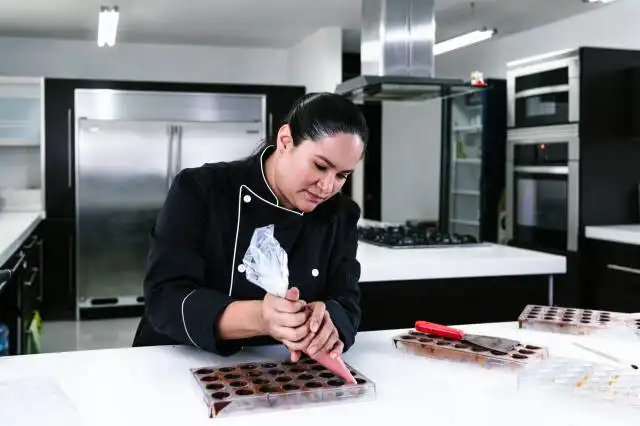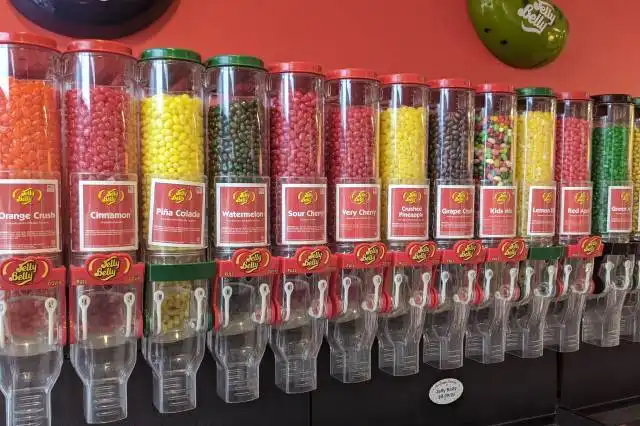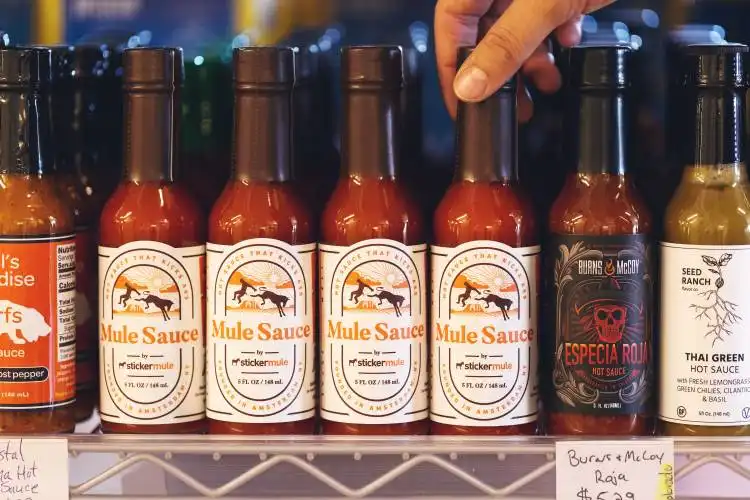Start a Bakery
Rolling in Dough: Embarking on Your Journey as a Bakeshop Entrepreneur
| Updated


BAKERY
Unleash your inner Mary Berry with your own bakery business! Kneading dough, frosting cupcakes, crafting artisan bread - these are no 'pie-in-the-sky' dreams, but the tangible (and tasty) realities of owning a bakery. This type of business kneads its way into the heart of the food industry by crafting and selling baked goods like bread, pastries, cakes, and cookies. Shed your oven mitts at the corporate world and prepare to rise through the business ranks one loaf at a time.
Jump to Business Plan
RELATED BUSINESS IDEAS
Browse ALL Food & Beverage Entrepreneurship Business Ideas
Discover Your Perfect Domain
Unlock the door to your online success with our hand-picked selection of premium domain names. Whether you're starting a new venture or rebranding an existing one, the right domain can set the tone for your digital presence. Browse through our curated list, each with its unique potential to enhance your brand's visibility and credibility.
BAKERY MINI BUSINESS PLAN
This a quick reality check to help you identify the strengths and weaknesses of your business concept before you dive in.
Expected Percent Margins:
- Gross Margin: Typically around 60-65% for a bakery industry
- Net Margin: Expected to be around 5-9%
Earnings Expectations:
- Daily Earnings: A range of $300 - $800
- Weekly Earnings: Projected between $2,100 - $5,600
- Monthly Earnings: Estimated around $9,000 - $24,000
- Annual Earnings: Total annual earnings could be $108,000 to $288,000
Actions to Achieve These Numbers:
Product Diversity:
- Initial Research: Identify popular baked goods in the locality; ensure diversity in offerings.
Cost Control:
- Ingredients Cost: The cost of ingredients should be about 25-35% of the retail price.
- Rent & Utilities: Aim for these to be no more than 15% of sales.
Marketing & Customer Acquisition:
- Online Presence: Develop a strong social media presence; consider targeted online ads.
- Community Engagement: Participate in local events and sponsor community causes.
Business Operations:
- Operating Hours: Minimum of 12 hours per day, 7 days a week, to maximize sales.
- Customer Volume: Aim for 50-100 transactions per day.
Staffing:
- Experienced Bakers: At least 3-4 experienced bakers to assure quality.
- Sales Personnel: Employ 2-3 friendly, service-oriented sales personnel.
Price Strategy:
- Product Pricing: Balance between affordability for customers and profit margins.
Please note that these are generalized estimates and actual results may vary depending on the demographics, location, competition, and the economic condition of each specific circumstance. Always consult with a financial advisor or consultant for personalized advice.
NOT WHAT YOU HAD IN MIND? Here are more ideas



Browse ALL Food & Beverage Entrepreneurship Business Ideas
Grab Your Business Website Name
Before you get caught up in the whirlwind of setting up your business, invest in a domain name. It's a small but significant step that lays the foundation for your brand and makes it easier for customers to find and trust you. Just like you wouldn't build a house without securing the land first, don't build a business without securing your domain name.
"Why? Can't that wait?" Here's why it shouldn't
Step 1: Determining if the Business is Right for You
Start-up Expenses
Before starting a bakery, it is important to determine the start-up expenses that will be required. This includes the cost of the building or space to house the bakery, the cost of any necessary equipment, the cost of ingredients, and the cost of any licenses or permits that may be required. Additionally, it is important to consider the cost of any advertising or marketing that will be necessary to get the business off the ground.
Ongoing Expenses
It is also important to consider the ongoing expenses associated with running a bakery. This includes the cost of ingredients, the cost of utilities, the cost of labor, and the cost of any necessary maintenance or repairs. Additionally, it is important to consider the cost of any necessary insurance, taxes, and other fees.
Examples of Ways to Make Money
There are many different ways to make money with a bakery. This includes selling baked goods directly to customers, selling baked goods to local businesses, catering events, and selling baked goods online. Additionally, it is possible to make money by teaching baking classes or selling baking supplies. It is important to consider all of these options when determining the best way to make money with a bakery.
Step 2: Naming the Business
When it comes to naming a business, it is important to come up with something that is catchy and memorable. It should also be easy to pronounce and spell. Additionally, it should be unique and distinct from other businesses in the same industry. It is also important to consider the potential for trademarking the name.
When coming up with a name, it is important to brainstorm and come up with a few ideas before settling on one. It is also important to do research to make sure that the name is not already in use. Additionally, it is important to consider the target audience and the message that the name conveys.
When selecting a name, it is important to consider the potential for branding and marketing. The name should be easy to remember and should be something that customers can easily associate with the business. Additionally, it should be something that can be used in advertising and marketing materials.
Finally, it is important to consider the potential for domain name availability. It is important to check to make sure that the domain name is available and that it can be used for a website or other online presence. Additionally, it is important to make sure that the domain name is easy to remember and is something that customers can easily type into a web browser.
Step 3: Developing a Business Plan
Outlining Goals
When developing a business plan, it is important to outline the goals of the bakery. This should include the desired size of the business, the types of products that will be offered, the target customer base, and the desired profit margin. It is also important to consider the long-term goals of the business, such as expansion into other markets or the introduction of new products.
Researching the Market
Before starting a bakery, it is important to research the local market. This includes researching the competition, understanding the customer base, and determining the demand for the products. It is also important to research the local regulations and licensing requirements, as well as any potential zoning issues.
Establishing a Budget
When developing a business plan, it is important to establish a budget. This should include a breakdown of startup costs, such as the cost of equipment, supplies, and licenses, as well as ongoing costs, such as rent, utilities, and payroll. It is also important to establish a budget for marketing and advertising, as well as any other expenses associated with running the business. Additionally, it is important to include a budget for unexpected expenses.
Step 4: Finding a Location
Factors to Consider
When looking for a location to start a bakery, there are a few key factors to consider. First, the location should be accessible to customers. This could mean being in a busy area with lots of foot traffic, or it could mean being in an area that is easy to find with good visibility. Second, the location should have enough space for the bakery. This means having enough room for the kitchen, the dining area, and any other necessary equipment. Third, the location should have the necessary utilities, such as water, electricity, and gas. Finally, the location should be within the budget of the business.
Obtaining a Lease
Once a suitable location has been found, the next step is to obtain a lease. This process can vary depending on the landlord and the type of property. Generally, the landlord will require a deposit, a credit check, and proof of insurance. Additionally, the landlord may require a business plan and proof of financial stability. It is important to read the lease carefully and make sure that all of the terms are clear before signing. Additionally, it is important to make sure that the lease is in line with the budget of the business.
Step 5: Obtaining Licenses and Permits
In order to legally operate a bakery, you must obtain the necessary licenses and permits from your local and state government. Depending on the state, you may need to obtain a business license, food service license, and health department permit. You may also need to obtain a zoning permit to ensure that you are operating in an area that allows for a bakery. Additionally, you may need to obtain a sales tax permit and a liquor license if you plan to serve alcoholic beverages. All of these permits and licenses will require an application process and a fee.
Federal Requirements
In addition to local and state requirements, you may need to obtain federal permits and licenses. Depending on the type of bakery you plan to open, you may need to obtain a federal food processing license. Additionally, you may need to obtain a federal tax identification number and register your business with the Internal Revenue Service (IRS). You may also need to obtain a federal trademark if you plan to use a unique name or logo for your bakery.
Professional Licenses
Depending on the type of bakery you plan to open, you may need to obtain a professional license. For example, if you plan to open a bakery that specializes in custom cakes, you may need to obtain a pastry chef license. Additionally, you may need to obtain a food handler’s license if you plan to serve food to customers.
Insurance
In order to protect your business, you will need to obtain the necessary insurance coverage. This should include general liability insurance, property insurance, and workers’ compensation insurance. Additionally, you may need to obtain product liability insurance if you plan to sell products that could potentially cause harm to customers.
Step 6: Setting Up the Bakery
Equipment and Supplies
When setting up a bakery, it is important to have the right equipment and supplies. This includes ovens, mixers, baking pans, cooling racks, and other tools and utensils. You will also need ingredients such as flour, sugar, butter, and eggs. Depending on the type of bakery, you may need additional ingredients such as chocolate chips, nuts, and fruits. It is important to research the type of equipment and supplies you need for the type of bakery you plan to open.
Designing the Space
The design of the bakery is also important. You will need to decide on the layout of the space, the type of furniture and fixtures, and the overall look and feel of the bakery. Consider the type of atmosphere you want to create and the type of customers you want to attract. You may want to include seating, a counter for customers to order from, and a display area for the baked goods. You may also want to include a kitchen area for the staff to work in. Additionally, you will need to consider the type of lighting and decorations that will create the desired atmosphere.
Step 7: Hiring Employees
Qualifications
When hiring employees for a bakery, it is important to consider the qualifications of each candidate. The ideal candidate should have experience in the food industry, as well as a passion for baking. Additionally, the candidate should have a strong work ethic and be able to work in a fast-paced environment. It is also important to consider the candidate’s customer service skills, as they will be interacting with customers on a daily basis. Finally, the candidate should have a strong knowledge of food safety and sanitation practices.
Training
Once the ideal candidate is found, it is important to provide them with the necessary training. This should include a thorough overview of the bakery’s products and services, as well as the proper techniques for baking and decorating. Additionally, the employee should be trained in the use of any equipment used in the bakery, such as ovens and mixers. Finally, the employee should be trained in the proper food safety and sanitation practices, as well as the proper customer service techniques.
Step 8: Promoting the Bakery
Advertising
Advertising is an important part of any business, and a bakery is no exception. There are a variety of ways to advertise a bakery, including print, radio, television, and online. Print advertising can include flyers, posters, and newspaper ads. Radio and television ads can be used to reach a wider audience. Online advertising can include search engine optimization, pay-per-click campaigns, and social media.
Social Media
Social media is a great way to promote a bakery. Platforms such as Facebook, Instagram, and Twitter can be used to reach potential customers. Creating a social media page for the bakery will allow customers to stay up to date on new products, special offers, and events. Additionally, social media can be used to engage with customers and build relationships. Creating content such as recipes, behind-the-scenes videos, and customer testimonials can help to create a connection with customers.
Step 9: Maintaining the Bakery
Staying Up-to-Date
It is important to stay up-to-date on the latest trends in the bakery industry. This means researching the latest products, flavors, and techniques that are popular. Additionally, it is important to stay up-to-date with the latest health and safety regulations. This includes ensuring that all ingredients and products are up-to-date with the latest food safety standards. It is also important to research the latest marketing techniques and strategies that can be used to promote the bakery.
Quality Control
Quality control is an important part of running a successful bakery. This means ensuring that all products are of the highest quality and that all ingredients are fresh and safe to consume. Quality control also means ensuring that all products are consistent in terms of flavor, texture, and appearance. Additionally, it is important to have a system in place to ensure that all products are made according to the recipes and instructions. This includes having a system for tracking ingredients, products, and production processes. Finally, it is important to have a system for tracking customer feedback and complaints to ensure that all products are of the highest quality.
EXPLORE MORE CATEGORIES
Browse ALL Business Idea Categories
TAKE THE NEXT STEPS









